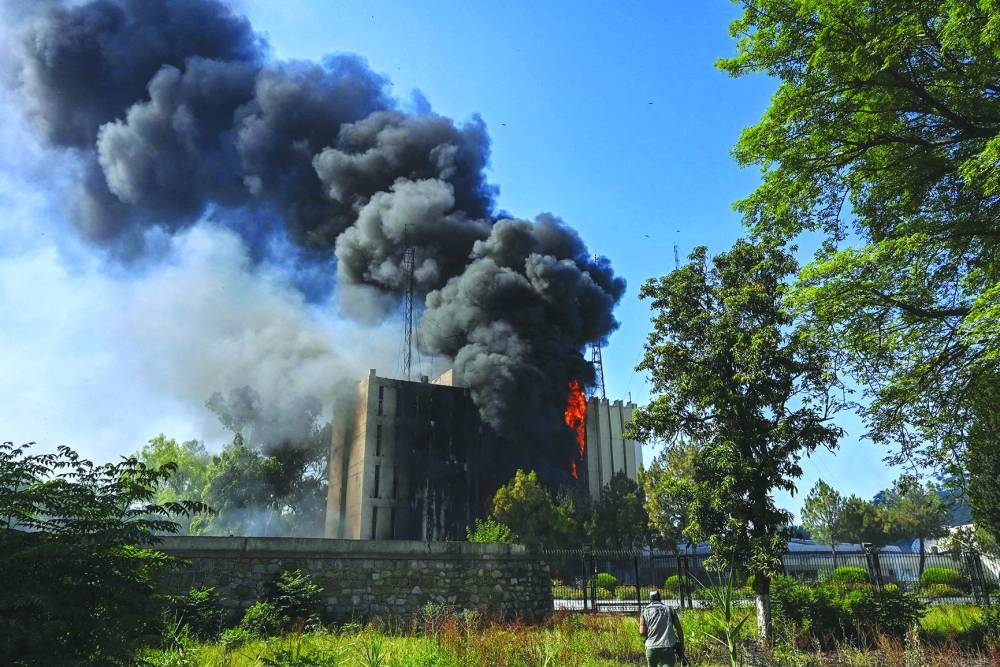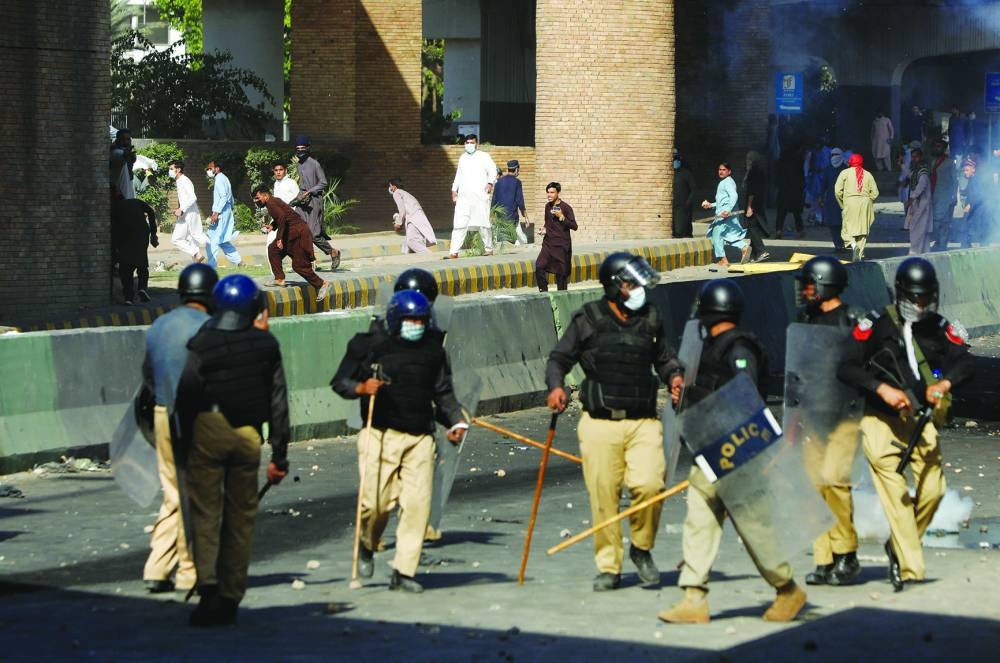Former Pakistan prime minister Imran Khan was remanded in custody for eight days yesterday by an anti-graft court as violent nationwide protests over his arrest erupted for a second day.
Khan was arrested Tuesday during a routine hearing in the capital Islamabad and whisked away to an unknown location overnight before appearing behind closed doors in a specially convened court at police headquarters.
The drama follows months of political crisis during which Khan, who was ousted in April last year, has waged an unprecedented campaign against the country’s powerful military.
“If they think that the arrest of Imran Khan will demoralise us, then they are hugely mistaken,” said Niaz Ali in Peshawar, where several monuments and government buildings have been torched.
“We stand with Imran Khan,” Ali Bukhari, a lawyer for Khan, said by phone that the court had approved eight days of physical remand of Khan demanded by the country’s top graft agency.
Afzal Marwat, another of Khan’s lawyers, earlier said Khan was in “good spirits” but had complained of being hit on the head and leg by paramilitary forces who arrested him.
The former cricketing superstar, who remains wildly popular, has previously said the dozens of cases brought against him are part of an effort by the struggling government and military establishment to prevent him from returning to power.
His arrest has brought thousands of his supporters to the streets in several cities were violent clashes have broken out with police who have fired tear gas and water cannon.
At least six people have died in protest-related incidents, police and hospitals reported, including one person who died from smoke inhalation after a building was set on fire in Lahore.
The cabinet yesterday approved the deployment of the army in three provinces including the capital to restore peace, a statement from Prime Minister Shehbaz Sharif’s office said.
The arrest and subsequent violence triggered swift reaction Tuesday from Western powers urging peaceful democracy. Yesterday, the UN weighed in, with Secretary-General Antonio Guterres urging a de-escalation and calling on authorities to “respect due process” and the rule of law in proceedings against Khan.
Guterres, in noting the ongoing protests, “calls for all parties to refrain from violence” and “he stresses the need to respect the right to peaceful assembly,” deputy spokesman Farhan Haq said in a statement.
Khan’s arrest came hours after the military rebuked him for alleging that a senior officer had been involved in a plot to kill him. Criticism of the military establishment is rare in Pakistan, where army chiefs hold significant influence over domestic politics and foreign policy, and have long been accused of interfering in the rise and fall of governments.
“The senior army leadership is uninterested in repairing the rift between itself and Khan,” said Michael Kugelman, director of the South Asia Institute at the Wilson Center.
“So with this arrest it’s likely sending a message that the gloves are very much off.”
The interior ministry had ordered mobile Internet services cut and restricted access to social media sites Twitter, Facebook and YouTube, the country’s communications agency said. Authorities have ordered schools closed nationwide — with year-end exams cancelled for students.
Hundreds of police officers have been injured across Pakistan, while in the populous province of Punjab nearly 1,000 people have been arrested.
Some protesters took out their wrath on the military, torching the residence of the corps commander in Lahore and gathering outside the entrance to the army’s general headquarters in Rawalpindi and pelting it with stones. Yesterday, the military’s media wing released a statement warning of a “strong reaction” against those who attack military and state installations. Law Minister Azam Nazeer Tarar told reporters there was “no political vendetta” surrounding Khan’s arrest. The case that led to his detention was brought by the National Accountability Bureau, Pakistan’s top anti-corruption body, which said he had ignored repeated summons to appear in court.
Pakistan is deeply mired in an economic and political crisis, with Khan agitating for early elections while the government is weighed down by security and economic turbulence.
Classified
Pakistan ex-PM Khan remanded in custody after arrest prompts riots
Former Pakistan prime minister Imran Khan was remanded in custody for eight days yesterday by an anti-graft court as violent nationwide protests over his arrest erupted for a second day.

Black smokes billows from a building set ablaze by Pakistan Tehreek-e-Insaf (PTI) party activists and supporters of former Pakistan prime minister Imran Khan during a protest against the arrest of their leader, in Peshawar, yesterday.

Supporters of Pakistan’s former prime minister Imran Khan throw stones towards police during a protest against Khan’s arrest, in Peshawar, yesterday.
